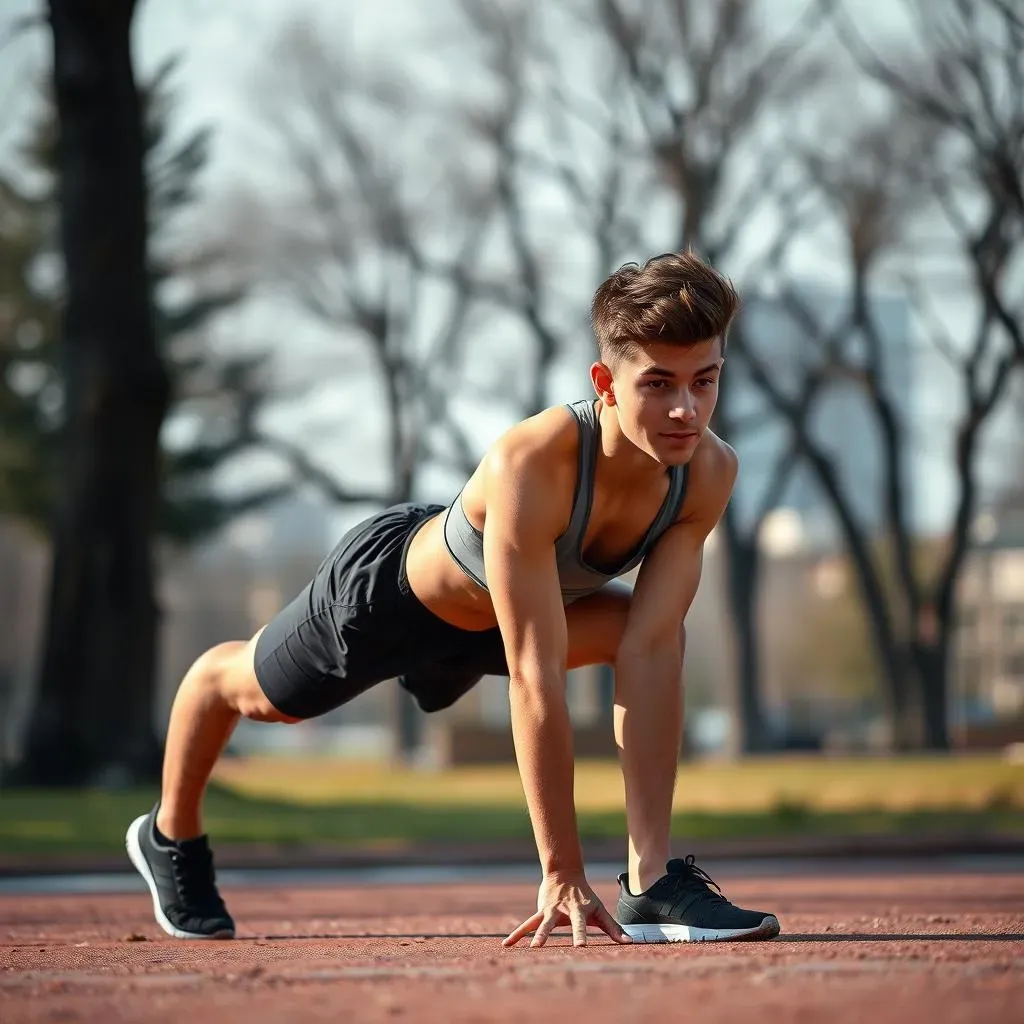Table of Contents
Welcome to the world of calisthenics débutant, where you can transform your body and reach new heights of fitness without any equipment. Calisthenics débutant is a journey that requires dedication, patience, and perseverance, but the rewards are well worth the effort. In this article, we will guide you through a 6-month program designed to take you from a beginner to a master level in calisthenics débutant. Our comprehensive program covers everything from the basics of calisthenics débutant to advanced techniques, nutrition, and mental toughness. Whether you're looking to improve your overall health, increase your strength and endurance, or simply challenge yourself, this program is tailored to help you achieve your goals. With calisthenics débutant, you'll learn how to harness your body weight to build a strong, lean, and agile physique. So, let's get started on this exciting journey and discover the full potential of calisthenics débutant.
Getting Started with Calisthenics Débutant: Understanding the Basics

Getting Started with Calisthenics Débutant: Understanding the Basics
Calisthenics débutant is a form of exercise that uses body weight as resistance to build strength, endurance, and flexibility. It's an excellent way to improve overall fitness without the need for any equipment or gym membership. As a beginner, it's essential to start with the basics and gradually progress to more advanced movements.
To get started with calisthenics débutant, you'll need to learn the fundamental exercises that target different muscle groups. These include push-ups, squats, lunges, dips, and planks. Mastering these exercises will provide a solid foundation for your fitness journey.
Exercise | Muscle Group | Benefits |
|---|---|---|
Push-ups | Chest, shoulders, triceps | Improves upper body strength and endurance |
Squats | Legs, glutes, core | Builds leg strength, improves balance and flexibility |
Lunges | Legs, glutes, core | Develops balance, coordination, and overall lower body strength |
Dips | Triceps, chest | Tones and strengthens the upper body |
Plank | Core, shoulders, back | Improves core strength, posture, and overall stability |
As you progress in your calisthenics débutant journey, you'll want to incorporate variations of these exercises to challenge yourself and avoid plateaus. For example, diamond push-ups, sumo squats, and side plank can add variety to your workouts.
- Start with shorter workouts and gradually increase duration and intensity
- Listen to your body and rest when needed to avoid injury
- Focus on proper form and technique to get the most out of each exercise
- Stay hydrated and fuel your body with a balanced diet
Calisthenics Débutant Workout Routine: Building Strength and Endurance

Calisthenics Débutant Workout Routine: Building Strength and Endurance
Creating a Balanced Workout Routine
A well-structured workout routine is essential for building strength and endurance in calisthenics débutant. It's crucial to balance your workouts to ensure you're targeting all major muscle groups. A typical routine should include a mix of upper body, lower body, and core exercises.
For beginners, it's recommended to start with 2-3 workouts per week, with at least one day of rest in between. As you progress, you can increase the frequency and intensity of your workouts. Remember to listen to your body and adjust your routine accordingly to avoid injury.
Day | Workout Focus | Example Exercises |
|---|---|---|
Monday | Upper Body | Push-ups, dips, pull-ups |
Wednesday | Lower Body | Squats, lunges, calf raises |
Friday | Core | Plank, Russian twists, leg raises |
- Warm up with 5-10 minutes of cardio and stretching
- Start with 3 sets of 8-12 reps for each exercise
- Gradually increase the number of sets and reps as you build endurance
Progressing Your Workout Routine
As you become more comfortable with the basics, it's time to progress your workout routine. This can be done by increasing the difficulty of exercises, adding more sets and reps, or decreasing rest time between sets.
Some examples of progressive exercises include diamond push-ups, decline push-ups, and single-leg squats. These variations will challenge your muscles and help you build strength and endurance faster.
Exercise | Progression | Benefits |
|---|---|---|
Push-ups | Diamond push-ups | Targets triceps and anterior deltoids |
Squats | Single-leg squats | Improves balance and leg strength |
Lunges | Walking lunges | Enhances coordination and endurance |
- Incorporate plyometric exercises like jump squats and box jumps
- Try isometric holds like plank and wall sits
- Experiment with different grip positions and angles
Maintaining Motivation and Consistency
Staying motivated and consistent is key to achieving success in calisthenics débutant. Surround yourself with like-minded individuals, track your progress, and celebrate small victories along the way.
Remember, consistency is more important than intensity. Aim to make calisthenics débutant a part of your lifestyle, and don't be too hard on yourself if you miss a workout.
- Find a workout buddy or join a calisthenics débutant community
- Take progress photos and measurements
- Reward yourself for reaching milestones
Nutrition and Recovery for Calisthenics Débutant: Fueling Your Body

Nutrition and Recovery for Calisthenics Débutant: Fueling Your Body
Understanding the Importance of Nutrition
Proper nutrition plays a vital role in your calisthenics débutant journey. It's essential to fuel your body with the right foods to support muscle growth, recovery, and overall performance. A balanced diet that includes protein, complex carbohydrates, and healthy fats will provide the necessary energy for your workouts and aid in recovery.
Aim to eat lean protein sources like chicken, fish, and beans, complex carbohydrates such as whole grains, fruits, and vegetables, and healthy fats like nuts, seeds, and avocados. Adequate hydration is also crucial, so make sure to drink plenty of water throughout the day.
Food Group | Examples | Benefits |
|---|---|---|
Lean Protein | Chicken, fish, beans, lentils | Builds and repairs muscle tissue |
Complex Carbohydrates | Brown rice, quinoa, whole wheat bread, fruits, vegetables | Provides energy for workouts and supports muscle recovery |
Healthy Fats | Nuts, seeds, avocados, olive oil | Supports heart health and provides sustained energy |
- Eat 5-6 meals per day, spaced out every 2-3 hours
- Include a source of protein with every meal
- Avoid sugary drinks and foods high in saturated fats
Recovery Techniques for Calisthenics Débutant
Recovery is just as important as the workout itself. Adequate rest and recovery allow your muscles to repair and grow, making you stronger and more resilient. Make sure to get 7-9 hours of sleep each night and take rest days as needed.
In addition to sleep, incorporate stretching and foam rolling into your daily routine. These techniques will help reduce muscle soreness and improve flexibility. You can also use tools like massage balls or rollers to target specific areas.
Recovery Technique | Frequency | Benefits |
|---|---|---|
Stretching | Daily, 10-15 minutes | Improves flexibility, reduces muscle soreness |
Foam Rolling | 2-3 times per week, 10-15 minutes | Reduces muscle tension, improves circulation |
Massage | 1-2 times per week, 30 minutes | Relaxes muscles, improves recovery |
- Listen to your body and take rest days as needed
- Incorporate activities like yoga or meditation to reduce stress
- Monitor your progress and adjust your recovery routine accordingly
Overcoming Challenges in Calisthenics Débutant: Mental Toughness and Discipline

Overcoming Challenges in Calisthenics Débutant: Mental Toughness and Discipline
Building Mental Toughness
Mental toughness is essential for overcoming challenges in calisthenics débutant. It's the ability to push through physical discomfort, stay motivated, and maintain a positive mindset even when faced with setbacks. Developing mental toughness takes time and practice, but it's crucial for achieving success in calisthenics débutant.
One way to build mental toughness is to set achievable goals and celebrate small victories along the way. This helps to boost confidence and motivation, making it easier to stay committed to your workout routine. Additionally, learning to manage stress and anxiety through techniques like meditation and deep breathing can help you stay focused and composed during challenging workouts.
Mental Toughness Technique | Frequency | Benefits |
|---|---|---|
Goal Setting | Daily or Weekly | Boosts motivation and confidence |
Meditation and Deep Breathing | Daily, 10-15 minutes | Reduces stress and anxiety, improves focus |
Positive Self-Talk | During Workouts | Enhances motivation, builds resilience |
- Set specific, measurable, and achievable goals
- Practice mindfulness and self-compassion
- Focus on progress, not perfection
Developing Discipline
Discipline is another critical component of success in calisthenics débutant. It's about creating a routine and sticking to it, even when you don't feel like it. Discipline helps you stay consistent, which is essential for making progress and avoiding plateaus.
One way to develop discipline is to create a schedule and stick to it. Set specific times for your workouts, rest, and nutrition, and try to stick to them as much as possible. Consistency will help your body adapt to the demands of calisthenics débutant and make progress more predictable.
Discipline Strategy | Implementation | Benefits |
|---|---|---|
Scheduling | Plan out your day, week, or month | Helps stay consistent and accountable |
Tracking Progress | Use a workout log or mobile app | Monitors progress, identifies areas for improvement |
Accountability Partner | Find a workout buddy or mentor | Provides motivation, support, and constructive feedback |
- Create a workout schedule and stick to it
- Track your progress and adjust your routine as needed
- Find an accountability partner to provide support and motivation
Advanced Calisthenics Débutant Techniques: Mastering the Next Level

Advanced Calisthenics Débutant Techniques: Mastering the Next Level
Mastering Advanced Exercises
As you progress in your calisthenics débutant journey, it's essential to incorporate advanced exercises into your routine. These movements will challenge your muscles, improve your technique, and help you achieve a higher level of fitness.
Some examples of advanced calisthenics débutant exercises include pistol squats, single-arm push-ups, and human flag. These exercises require a great deal of strength, balance, and control, so it's crucial to master the basics before attempting them.
Exercise | Muscle Group | Benefits |
|---|---|---|
Pistol Squats | Legs, glutes, core | Improves balance, strength, and overall lower body development |
Single-Arm Push-Ups | Chest, shoulders, triceps | Increases upper body strength and stability |
Human Flag | Core, shoulders, back | Builds core strength, improves posture, and enhances overall stability |
- Start with modified versions of advanced exercises
- Focus on proper form and technique
- Gradually increase the difficulty as you build strength and confidence
Developing a Pre-Workout Routine
A proper pre-workout routine is essential for optimal performance in calisthenics débutant. This includes a dynamic warm-up to prepare your muscles, as well as mental preparation to get you focused and motivated.
A dynamic warm-up should include light cardio such as jogging in place or jumping jacks, followed by mobility exercises like arm circles and leg swings. Additionally, visualize your workout and set clear goals for what you want to achieve.
Warm-Up Activity | Duration | Benefits |
|---|---|---|
Light Cardio | 5-10 minutes | Increases blood flow and temperature |
Mobility Exercises | 5-10 minutes | Improves flexibility and range of motion |
Mental Preparation | 2-5 minutes | Enhances focus, motivation, and mental toughness |
- Create a consistent warm-up routine
- Listen to music that motivates you
- Use positive self-talk to boost confidence
Fine-Tuning Your Technique
As you master advanced calisthenics débutant exercises, it's essential to fine-tune your technique. This includes paying attention to details such as body positioning, movement control, and breathing.
Focus on slow and controlled movements, especially during the eccentric phase of exercises. This will help improve your overall technique and reduce the risk of injury.
Technique Tip | Exercise | Benefits |
|---|---|---|
Slow and Controlled Movement | Pistol Squats | Improves strength, control, and balance |
Proper Body Positioning | Single-Arm Push-Ups | Reduces injury risk, enhances effectiveness |
Deep Breathing | Human Flag | Improves stability, reduces stress |
- Practice in front of a mirror to monitor your form
- Record yourself to analyze your technique
- Work with a coach or experienced calisthenics débutant practitioner
Conclusion: Unlocking Your Full Potential with Calisthenics Débutant
After completing the 6-month calisthenics débutant program, you'll be amazed at the transformation you've undergone. From building a strong foundation to mastering advanced movements, you'll have developed the strength, endurance, and mental toughness needed to take your fitness journey to new heights. Remember, calisthenics débutant is not just a workout routine – it's a lifestyle that requires dedication, patience, and persistence. Stay committed, listen to your body, and always strive for progress, not perfection. With calisthenics débutant, you'll unlock your full potential and achieve a level of fitness you never thought possible. So, keep pushing yourself, and you'll be on your way to becoming a calisthenics débutant master.
